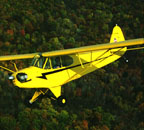 Grassroots
Grassroots

DNA and the Risk Takers
Grassroots
Budd Davisson, Plane and Pilot August, 1998
DNA and the Risk Takers
I love going to the dentist. No, amend that. What I mean to say is I like sitting in the dentist's waiting room because I get to paw through their pile of dog eared magazines. You never know what you'll find. It's a cross between an archeological dig and a treasure hunt.
The last time I was at the tooth mechanic's I ran across an old issue of Science Newsletter. This particular issue had an extensive article on a study which had just been completed on the DNA of risk takers. The test candidates came from a population which, by choice, had selected occupations and life styles that involved varying amounts of risk. They ranged from being a CPA with the same firm for 30 years to high-steel workers, from long time assembly line workers to entrepreneurs who were living by their wits.
The conclusion of the study was that those individuals who sought out, or willingly accepted, an element of risk in their daily lives had a slightly different DNA structure than most folks. As I look around at the population, I'd have to agree with its findings. I think there definitely is a basic difference between those who do, and those who don't, take risks.
Naturally, there has to be some sort of definition of "risk." It doesn't always involve dangling off a skyscraper or diving at the ground at 400 knots. Risk is often defined by the comfort zone of the majority of any given population. Go outside that comfort zone and it's judged a risk. If the entire population, however, hangs from skyscrapers or dives at the ground, then activities such as those are no longer considered risks.
I took the study's finding, that risk takers have a different DNA structure, and used that to build another theory. Think about how this country was founded: normal, everyday people, living in a European civilization that was centuries old and well established, chose to spend three months onboard dinky little boats and brave angry seas to go to a land they knew full well was entirely wilderness. By that time in Europe, wilderness was nearly a thing of the past. Threat by wild animals or from up-rooted native populations was unheard of. Yet they did it. Talk about risk takers!
The logical extension of that kind of thinking is that the majority of our founding fathers and mothers were risk takers. So, assuming the study is right, those who founded our country all had a slightly different DNA structure. They then passed their DNA structure onto the population they founded on our shores. In other words, they founded a nation of risk takers. Putting our nation's history in that context explains a lot about us, doesn't it?
By the way; just having risk taker DNA doesn't mean an individual is better or worse than any other. It just means that they are not necessarily driven by the need for security or a low risk life style. This explains why we have Jesse James on one hand and little Tommy Edison on the other. There are lots of different flavors of risk taking.
If you assume the American tolerance for risk is higher than that of most other nations, then what about those Americans whom we ("we" meaning the general population) see as standing above the rest in terms of taking risks. Does their DNA have some sort of identifiable super-squiggle that sets them even further apart from the norm? Do pilots fall into that category?
In the US, there are less than 700,000 pilots. Since we all know there are many more in the population who can afford to fly, why don't they? Lack of interest? Maybe. A refusal to add that element of risk to their risk-package. Probably. For most folks, flying a little airplane falls outside their comfort zone. It is definitely not for everyone, not even in a population with a higher than normal percentage of risk takers. Those who do fly, however, see it as an acceptable risk. Does this mean that in them there's yet another tightening of the DNA strand? Another little kink?
And what about those pilots who raise the bar another notch and are always flying on the edge of the envelope? What about crop dusters, borate bombers and airshow pilots? To they share some kind of DNA-dynamite that would put their kinky little strands into a class by themselves?
Possibly the most interesting question is whether risk takers pass their brand of DNA down? Does one generation pass it to the next? Even something as simple as being self employed entails more risk than many are willing to tolerate. Does that move down the gene stream? Hmmm. Let me see. Dad and mom were self employed. They had four kids. None of us have ever held a regular job. Hmmm. What do you suppose that means? That we're bums? Or that we have twisted DNA? I vote for the latter. BD